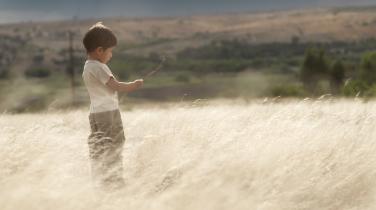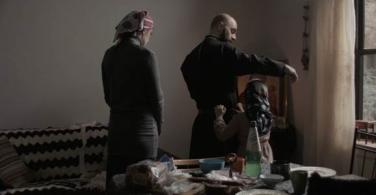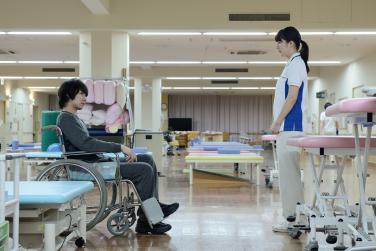



Novermber 12, thursday, 19:00
SSIFF + PLUS: FIRST STEPS (2)
- Amor, Isabel Lamberti, Netherlands, 2017, 25’
- Ukhilavi sivrtseebi / Invisible Spaces, Dea Kulumbegashvili, Georgia, 2014, 10'
- 400 maletas, Fernanda Valadez, México, 2015, 23’
- Sticks and Stones, Takuma Sato, 2019, Japan, 37’
Amor, Isabel Lamberti, Netherlands, 2017, 25'
AMOR shows, in a number of fragmentary scenes, moments of a day in the lives of a group of teenage girls in the outskirts of a big city in the Netherlands. In a contemplative style the short film outlines the lack of love in their daily lives, in its broadest sense. Not only does the film focusses on the cold relations between the group and their environment but also explores the relationships within the group itself.
Isabel Lamberti (Bühl, Germany. 1987) studied Film Theory and Directing at the TISCH School of the Arts in New York and at the Netherlands Film Academy. Although she initially focussed on directing documentaries, while studying she developed a cinema of in-betweenness combining reality and fiction. Her short films Volando voy (2015), which received the Nest Film Students’ Torino Award in San Sebastian, Amor (2017) and Father (2019) were selected for and won awards at several international film festivals. In 2018 she codirected the Dutch remake of the successful teen series Skam for public television. Last year she sat on the New Directors jury in San Sebastian. La última primavera (Last Days of Spring) is her first feature film and it carried off the Kutxabank-New Directors Award in San Sebastian Festival’s 68th edition.
Ukhilavi sivrtseebi / Invisible Spaces, Dea Kulumbegashvili, Georgia, 2014, 10’
Invisible Spaces is an intimate glimpse into the world where family hierarchy, religion and the place of the woman are uncontested. Georgian Director Dea Kulumbegashvili’s story lifts the veil on a traditional Georgian family. It is the barriers in which a priest husband holds his exasperated wife captive that create the invisible space. It is only when the wife lets out her frustration on their ingenuous daughter that she realizes the futility of her plight in the face of patriarchy and entrapment. The film asks us to shift our wandering gaze on the faces we tend to overlook and the voices we so often opt to shut out of our experience of the modern society.
Dea Kulumbegashvili (Georgia, 1986) studied film directing at Columbia University, in New York. She has directed the short films Ukhilavi sivrtseebi (Invisible Spaces, 2014), which competed in the Official Short Film Section at the Festival de Cannes, and Léthé (2016), with which she returned to the French competition, this time to the Quinzaine des Réalisateurs. Dasatskisi is her first feature film and it was part of the official selection of the Festival de Cannes 2020, cancelled due to Covid-19. In San Sebastian Festival’s 68th edition it carried off four accolades: the Golden Shell for Best Film, the Silver Shell for Best Director, the Silver Shell for Best Actress (Ia Sukhitashvili) and the Jury Prize for Best Screenplay (Dea Kulumbegashvili and Rati Oneli). .
400 maletas, Fernanda Valadez, México, 2015, 23'
Magdalena makes a journey to find her missing son, who disappeared on his way to the border with the United States. Accompanied only by her will and her memories, Magdalena enters a violent and desolated territory, the migration route in Mexico.
Fernanda Valadez (Guanajuato, México, 1981) is a film director, screenwriter and producer. In 2015 she directed the short film, 400 maletas (400 Bags, 2014), which was nominated for the Ariel award. Amongst other feature films, she has produced Los días más oscuros de nosotras (The Darkest Days of Us, 2017), directed by Astrid Rondero, nominated for two Ariel awards and winner of seven international accolades. Sin señas particulares (Non Distinguishing Features), her first feature film as a director, received the Films in Progress Industry Award at the San Sebastian Festival in 2018 and premiered in the World Dramatic Competition at the last Sundance Festival, where it landed the Audience Award and the Special Jury Award for Best Screenplay. The film won the Horizontes Award in San Sebastian Festival’s 68th edition.
Sticks and Stones, Takuma Sato, Japan, 37’
Haruka is a rookie physical therapist at an inpatient rehabilitation hospital in Japan. Just after her boyfriend suddenly dumps her, it’s set that the very first patient she’ll be in charge of through his hospitalization is Mr. Tsuge, who is paralyzed on his left side from a stroke. On the first day of rehabilitation, Tsuge asks Haruka, “Can I go back to my old life?” but she cannot answer. Under the mentorship of Department Chief, she begins to realize how rewarding the job can be and decides to confront both Tsuge and her ex-boyfriend.
Takuma Sato (Tokio, 1977) directed, in 2014, his first feature film, Don’t Say That Word, which won the Audience and Cinema Fan Awards at Pia Film Festival and was also a candidate for the New Currents award at Busan Festival. He has also directed the short films Kowaru hajime teru, hei hei hei (Beginning to Break, Hey, Hey, Hey, 2015), Sudden (2017), Happy Happy Saturday (2018) and Sticks and Stones (2018). Nakuko wa ineega is his second full-length film and it carried off the Jury Prize for Best Cinematography (Yuta Tsukinaga) in San Sebastian Festival’s 68th edition.
The San Sebastián Festival continues reviewing the first steps of several filmmakers awarded in the 68th edition.
